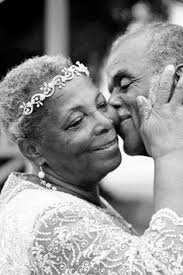I’m noticing more and more movies about love in the elder years –RBG, The Wife, The Old Man and the Gun, and the Netflix series Grace and Frankie. RBG, Ruth Bader Ginsberg, a Supreme Court Justice in her 80s, gives a lot of credit to her husband in her documentary. Glen Close plays The Wife whose marriage goes through changes when her husband wins a Nobel Prize. Robert Redford at 82 plays the Old Man whose pick up line to Sissy Spacek’s character is “I rob banks.” Grace and Frankie live together because their long-time husbands have come out as gay and gotten married. Their grown kids have a lot to say. To me, at 72, these movies are so much more interesting than the slew of pics about young romance.
Though the young bodies are fun to look at, the stories are so predictable – couplings that are hormone-driven, fantasy-fueled, and therefore ultimately doomed. Usually the movie ends before we get to see the nitty gritty dailiness of the relationship, which, I guess, is the point. That way we can indulge our imaginings of a Happily-Ever-After or we can wallow in despair about mistakes the characters make that remind us of our own.
Geezer love, on the other hand is complex and realistic and not afraid to come across that way on screen in the movies I’ve noted. After a certain age, prospective partners are freer from rampant ambition and the tyranny of the sex drive. They are challenged by the ultimate questions of loyalty, accommodation, empathy, perseverance, and mortality.
Built into a relationship for elders is the loss of friends, various appalling betrayals of the body, and children and grandchildren. What do our offspring think of us? How might we have failed them? Are they our primary relationship or are we free to choose our own, even if they disapprove? Will they thrive on their own? Our children are our gift and our bridge to the future. But here’s the twist: It’s not a future we can control or share. How will they clean up the messes we made, we wonder? Older couples grapple with these issues, sometimes presenting a united front, sometimes pulling in opposite directions.
Even though I sometimes go to the movies to escape these difficult questions, spare me the coming-of-age romance that makes me nostalgic for something I’m probably remembering wrong anyway. I’d rather see my struggles reflected, often humorously, in movies made for (back to the old-fashioned literal meaning of the word) mature audiences.
Orissa Arend is a mediator, psychotherapist, and author of Showdown in Desire: The Black Panthers Take a Stand in New Orleans. You can reach her at arendsaxer@bellsouth.net.

